Latest Sheet Music
The Sound of Music

The Sound of Music is a musical with music by Richard Rodgers, lyrics by Oscar Hammerstein II, and a book by Howard Lindsay and Russel Crouse. It is based on the memoir of Maria von Trapp, The Story of the Trapp Family Singers. Songs from the musical that have become standards include "The Sound of Music", "Edelweiss", "My Favorite Things", "Climb Ev'ry Mountain", and "Do-Re-Mi".
The original Broadway production opened in November 1959, and the show has enjoyed numerous productions and revivals since then. It has also been made into an Academy Award-winning 1965 movie musical. The Sound of Music was the final musical written by Rodgers and Hammerstein; Hammerstein died of cancer nine months after the Broadway premiere.
The original Broadway production opened in November 1959, and the show has enjoyed numerous productions and revivals since then. It has also been made into an Academy Award-winning 1965 movie musical. The Sound of Music was the final musical written by Rodgers and Hammerstein; Hammerstein died of cancer nine months after the Broadway premiere.
West Side Story

West Side Story is a 1961 film directed by Robert Wise and Jerome Robbins. It is an adaptation of the Broadway musical of the same name, adapted from William Shakespeare's Romeo and Juliet. It stars Natalie Wood, Richard Beymer, Russ Tamblyn, Rita Moreno, George Chakiris, and was photographed by Daniel L. Fapp, A.S.C. in Super Panavision 70.
The action was filmed largely in Los Angeles on sets designed by Boris Leven, although the film's opening sequence was shot on the streets of New York City, mainly in the area where the Lincoln Center campus of Fordham University now stands. The construction of the new campus was halted to allow completion of the sequence. Jerome Robbins, who had directed the stage version, was responsible for planning and directing all music and dance sequences in the film, as well as all the fight scenes. When approximately 60% of principal photography was complete, the producers became concerned that the production was over-budget and Robbins was fired. His final contribution before leaving the film was to write out the staging for the rumble.
The film was released on October 18, 1961 through United Artists. It received praise from critics and the public and became the second highest grossing film of the year, domestically. The film won ten Academy Awards in its eleven nominated categories as well as a special award for Robbins, including Best Picture. The soundtrack album made more money than any other album before it.
The action was filmed largely in Los Angeles on sets designed by Boris Leven, although the film's opening sequence was shot on the streets of New York City, mainly in the area where the Lincoln Center campus of Fordham University now stands. The construction of the new campus was halted to allow completion of the sequence. Jerome Robbins, who had directed the stage version, was responsible for planning and directing all music and dance sequences in the film, as well as all the fight scenes. When approximately 60% of principal photography was complete, the producers became concerned that the production was over-budget and Robbins was fired. His final contribution before leaving the film was to write out the staging for the rumble.
The film was released on October 18, 1961 through United Artists. It received praise from critics and the public and became the second highest grossing film of the year, domestically. The film won ten Academy Awards in its eleven nominated categories as well as a special award for Robbins, including Best Picture. The soundtrack album made more money than any other album before it.
Company
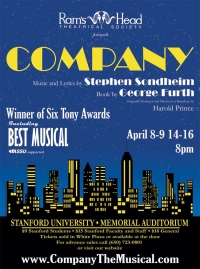
Company is a musical with a book by George Furth and music and lyrics by Stephen Sondheim.
Originally entitled Threes, its plot revolves around Bobby (a single man unable to commit fully to a steady relationship, let alone marriage), the five married couples who are his best friends, and his three girlfriends. Unlike most book musicals, which follow a clearly delineated plot, Company is a concept musical composed of short vignettes, presented in no particular chronological order, linked by a celebration for Bobby's 35th birthday.
Company was among the first musicals to deal with adult problems through its music. As Sondheim put it, "they are middle-class people with middle class-problems." It is also one of the first musicals where the songs commented on the characters in the play instead of furthering the plot, a device which became a Sondheim standard.
Originally entitled Threes, its plot revolves around Bobby (a single man unable to commit fully to a steady relationship, let alone marriage), the five married couples who are his best friends, and his three girlfriends. Unlike most book musicals, which follow a clearly delineated plot, Company is a concept musical composed of short vignettes, presented in no particular chronological order, linked by a celebration for Bobby's 35th birthday.
Company was among the first musicals to deal with adult problems through its music. As Sondheim put it, "they are middle-class people with middle class-problems." It is also one of the first musicals where the songs commented on the characters in the play instead of furthering the plot, a device which became a Sondheim standard.
Aida

Aida is a musical drama in two acts based on Giuseppe Verdi's Italian-language opera by the same name, which is based on a story by Auguste Mariette which is based on Shakespeare's Romeo and Juliet. The musical was produced by Hyperion Theatricals, a unit within Disney Theatrical, with music by Elton John, lyrics by Tim Rice, and book by Linda Woolverton, Robert Falls, and David Henry Hwang.
Elaborate Lives: The Legend of Aida had its world premiere at the Alliance Theatre in Atlanta, Georgia with the production running from September 16 to November 8, 1998. A new, revised production opened on November 12, 1999 at the Cadillac Palace in Chicago. The Broadway production, titled Elton John and Tim Rice's Aida, ran at the Palace Theatre from March 23, 2000 to September 4, 2004 for a total of 1,852 performances (and 30 previews). There was also produced a national tour and several international productions. Aida has recently become popular among school and community theaters. Licensing of these amateur productions of Aida is through Music Theatre International.
Elaborate Lives: The Legend of Aida had its world premiere at the Alliance Theatre in Atlanta, Georgia with the production running from September 16 to November 8, 1998. A new, revised production opened on November 12, 1999 at the Cadillac Palace in Chicago. The Broadway production, titled Elton John and Tim Rice's Aida, ran at the Palace Theatre from March 23, 2000 to September 4, 2004 for a total of 1,852 performances (and 30 previews). There was also produced a national tour and several international productions. Aida has recently become popular among school and community theaters. Licensing of these amateur productions of Aida is through Music Theatre International.
Calamity Jane
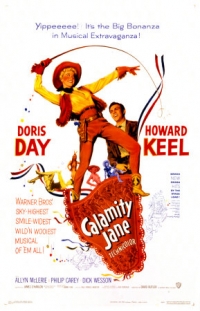
Calamity Jane is a "Wild West"-themed film released in 1953. It is (very) loosely based on the life of Wild West heroine Calamity Jane and explores an alleged romance between Calamity Jane and Wild Bill Hickok in the American Old West. The film starred Doris Day as the title character and Howard Keel as Hickok. It was devised by Warner Brothers in response to the success of Annie Get Your Gun.
It won the Academy Award for Best Original Song ("Secret Love", Sammy Fain and Paul Francis Webster) and was also nominated for Scoring of a Musical Picture and Best Sound, Recording.
The songs and screenplay form the basis of a stage musical of the same name that has had a number of productions. The film was also adapted for television in 1963, with Carol Burnett in the title role.
It won the Academy Award for Best Original Song ("Secret Love", Sammy Fain and Paul Francis Webster) and was also nominated for Scoring of a Musical Picture and Best Sound, Recording.
The songs and screenplay form the basis of a stage musical of the same name that has had a number of productions. The film was also adapted for television in 1963, with Carol Burnett in the title role.
The Hunchback of Notre Dame

The Hunchback of Notre Dame is a 1996 animated feature produced by Walt Disney Feature Animation and released to theaters on June 21, 1996 by Walt Disney Pictures. The thirty-fourth animated feature in the Disney animated features canon, the film is inspired by Victor Hugo's The Hunchback of Notre Dame. While the basic structure remains, the film differs greatly from its source material. The plot centers on the teenaged Gypsy dancer, Esmeralda; Claude Frollo, a powerful and ruthless judge who lusts after her; Quasimodo, the protagonist, Notre Dame's kind-hearted but deformed bellringer, who adores her; and Phoebus, the chivalrous if irreverent military captain, who holds affections for her.
The film was directed by Kirk Wise and Gary Trousdale, directors of Beauty and the Beast, and produced by Don Hahn, producer of Beauty and the Beast and The Lion King. The songs for the musical film were composed by Alan Menken and Stephen Schwartz, and the film featured the voices of Tom Hulce, Demi Moore, Kevin Kline, Paul Kandel, Jason Alexander, Charles Kimbrough, David Ogden Stiers, Tony Jay, and Mary Wickes (in her final film role). It belongs to the era known as Disney Renaissance. A direct-to-video sequel, The Hunchback of Notre Dame II, was released in 2002.
The Hunchback of Notre Dame: An Original Walt Disney Records Soundtrack includes songs written by Alan Menken and Stephen Schwartz with vocals performed by Paul Kandel, David Ogden Stiers, Tony Jay, Tom Hulce, Heidi Mollenhauer, Jason Alexander, Mary Wickes, and Mary Stout, along with singles by All-4-One/Eternal and Bette Midler, and the film's score composed by Alan Menken. The single Someday originally performed by All 4 One on the United States release, was redone by British R&B girl group Eternal for the U.K. release. Luis Miguel recorded the version in spanish, which has become a major hit in Mexico. The album was released on July 3, 1996 by Walt Disney Records, and went on to peak at #11 on The Billboard 200.
The film was directed by Kirk Wise and Gary Trousdale, directors of Beauty and the Beast, and produced by Don Hahn, producer of Beauty and the Beast and The Lion King. The songs for the musical film were composed by Alan Menken and Stephen Schwartz, and the film featured the voices of Tom Hulce, Demi Moore, Kevin Kline, Paul Kandel, Jason Alexander, Charles Kimbrough, David Ogden Stiers, Tony Jay, and Mary Wickes (in her final film role). It belongs to the era known as Disney Renaissance. A direct-to-video sequel, The Hunchback of Notre Dame II, was released in 2002.
The Hunchback of Notre Dame: An Original Walt Disney Records Soundtrack includes songs written by Alan Menken and Stephen Schwartz with vocals performed by Paul Kandel, David Ogden Stiers, Tony Jay, Tom Hulce, Heidi Mollenhauer, Jason Alexander, Mary Wickes, and Mary Stout, along with singles by All-4-One/Eternal and Bette Midler, and the film's score composed by Alan Menken. The single Someday originally performed by All 4 One on the United States release, was redone by British R&B girl group Eternal for the U.K. release. Luis Miguel recorded the version in spanish, which has become a major hit in Mexico. The album was released on July 3, 1996 by Walt Disney Records, and went on to peak at #11 on The Billboard 200.
The Wild Party

The Wild Party is a musical with book, lyrics, and music by Andrew Lippa. It is based on Joseph Moncure March's 1928 narrative poem of the same name. It coincidentally debuted during the same theatre season (1999-2000) as a Broadway production with the same name and source material.
The Wizard of Oz
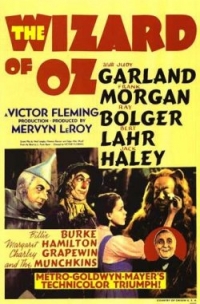
The Wizard of Oz is a 1939 American musical-fantasy film mainly directed by Victor Fleming and based on the 1900 children’s novel The Wonderful Wizard of Oz by L. Frank Baum. The film features Judy Garland as Dorothy Gale, Ray Bolger as the Scarecrow, Jack Haley as the Tin Man, Bert Lahr as the Cowardly Lion, Billie Burke as Glinda the Good Witch of the North, Margaret Hamilton as the Wicked Witch of the West, and Frank Morgan as the Wizard.
The film follows schoolgirl Dorothy Gale who lives on a Kansas farm with her Aunt Em and Uncle Henry, but dreams of a better place "somewhere over the rainbow." After being struck unconscious during a tornado by a piece of broken window, Dorothy dreams that she, her dog Toto, and the farmhouse are transported to the magical Land of Oz. There, the Good Witch of the North Glinda advises Dorothy to follow the yellow brick road to Emerald City and meet the Wizard of Oz, who can return her to Kansas. During her journey, she meets a Scarecrow, Tin Man and a Cowardly Lion, who join her, hoping to receive what they lack themselves (a brain, a heart, and courage, respectively), all of this is done while also trying to avoid the many plots of the Wicked Witch of the West, in her attempt to get the ruby slippers that Dorothy received from the squashed Wicked Witch of the East.
The Wizard of Oz is widely noted for its musical selections and soundtrack. The songs from The Wizard of Oz became widely popular, with "Over the Rainbow" receiving the Academy Award for Best Original Song, and the film itself garnering several Academy Award nominations, including Best Picture.
The film follows schoolgirl Dorothy Gale who lives on a Kansas farm with her Aunt Em and Uncle Henry, but dreams of a better place "somewhere over the rainbow." After being struck unconscious during a tornado by a piece of broken window, Dorothy dreams that she, her dog Toto, and the farmhouse are transported to the magical Land of Oz. There, the Good Witch of the North Glinda advises Dorothy to follow the yellow brick road to Emerald City and meet the Wizard of Oz, who can return her to Kansas. During her journey, she meets a Scarecrow, Tin Man and a Cowardly Lion, who join her, hoping to receive what they lack themselves (a brain, a heart, and courage, respectively), all of this is done while also trying to avoid the many plots of the Wicked Witch of the West, in her attempt to get the ruby slippers that Dorothy received from the squashed Wicked Witch of the East.
The Wizard of Oz is widely noted for its musical selections and soundtrack. The songs from The Wizard of Oz became widely popular, with "Over the Rainbow" receiving the Academy Award for Best Original Song, and the film itself garnering several Academy Award nominations, including Best Picture.
Fame

Fame – The Musical (based on the 1980 movie by Alan Parker) conceived and developed by David De Silva is a musical with a book by Jose Fernandez, music by Steve Margoshes and lyrics by Jacques Levy. De Silva was fascinated by New York's High School for Performing Arts (Which became Fiorello H. LaGuardia HS of Music and Art and Performing Arts in 1984) and created first the 1980 film about how the dedicated students there were inspired by the arts. The film was followed by a long-running television series, a reality show, and finally the musical. The musical is significantly rewritten from the previous adaptations, with an almost entirely new score.
First produced in 1988 in Miami, Florida, Fame – the Musical has enjoyed numerous professional and amateur productions. The musical has been seen by nearly 4 million people since its West End premiere in 1995. The West End production was nominated for 2 Laurence Olivier Awards. The show played in New York Off-Broadway at the Little Schubert Theatre in 2003-04, for a total of 304 performances. On April 4, 2008 FAME opened in Paris at the Teatre Comedia to great acclaim. The American debut of the sequel production entitled Fame Forever: Reunion and Rebirth opened September 21 with a gala performance and continued through September 30, 2007 at the Waterville Opera House, Waterville, Maine. It also received a co-debut at The Players of Sarasota in Sarasota, Florida opening around the same time, but running to October 7th. This debut show at The Players, as it is called locally, was directed by legendary performer,choreographer, and actor Thomas DeWyane Barrett.
First produced in 1988 in Miami, Florida, Fame – the Musical has enjoyed numerous professional and amateur productions. The musical has been seen by nearly 4 million people since its West End premiere in 1995. The West End production was nominated for 2 Laurence Olivier Awards. The show played in New York Off-Broadway at the Little Schubert Theatre in 2003-04, for a total of 304 performances. On April 4, 2008 FAME opened in Paris at the Teatre Comedia to great acclaim. The American debut of the sequel production entitled Fame Forever: Reunion and Rebirth opened September 21 with a gala performance and continued through September 30, 2007 at the Waterville Opera House, Waterville, Maine. It also received a co-debut at The Players of Sarasota in Sarasota, Florida opening around the same time, but running to October 7th. This debut show at The Players, as it is called locally, was directed by legendary performer,choreographer, and actor Thomas DeWyane Barrett.
Newsies

Newsies is a 1992 Disney live action film musical starring Christian Bale, David Moscow, and Bill Pullman. Robert Duvall and Ann-Margret also appeared in supporting roles. The movie gained a cult following after its initial failure at the box office. The film marked the directorial debut of choreographer Kenny Ortega (Dirty Dancing, High School Musical) and featured the music of composer Alan Menken (Little Shop of Horrors, The Little Mermaid, Beauty and the Beast, Aladdin).
Although the film was not originally intended to be a musical, it contains twelve songs and multiple dance sequences (for which the young cast trained for approximately 10 weeks). Musical highlights include "Carrying the Banner," "Santa Fe," "Seize The Day," and "King of New York."
Although the film was not originally intended to be a musical, it contains twelve songs and multiple dance sequences (for which the young cast trained for approximately 10 weeks). Musical highlights include "Carrying the Banner," "Santa Fe," "Seize The Day," and "King of New York."
Hair

Hair: The American Tribal Love-Rock Musical is a rock musical with a book and lyrics by James Rado and Gerome Ragni and music by Galt MacDermot. A product of the hippie counter-culture and sexual revolution of the 1960s, several of its songs became anthems of the anti-Vietnam War peace movement. The musical's profanity, its depiction of the use of illegal drugs, its treatment of sexuality, its irreverence for the American flag, and its nude scene caused much comment and controversy. The musical broke new ground in musical theatre by defining the genre of the "rock musical", utilizing a racially-integrated cast and inviting the audience onstage for a "Be-in" finale.
Hair tells the story of the "tribe", a group of politically active, long-haired "Hippies of the Age of Aquarius" fighting against conscription to the Vietnam War and living a bohemian life together in New York City. They struggle to balance their young lives, loves and the sexual revolution with their pacifist rebellion against the war and the conservative impulses of their parents and society. Claude, one of the leaders of the tribe, must decide whether or not to resist the draft, as his friends have done.
After an off-Broadway debut in October 1967 at Joseph Papp's Public Theater and another run in a midtown discothèque space, the show opened on Broadway in April 1968 and ran for 1,750 performances, followed by a successful London production, which ran for 1,997 performances. Numerous productions have been staged around the world since then, and numerous recordings of the musical have been released. Several of the songs from its score became Top 40 hits, and a successful movie adaptation was released in 1979.
Hair tells the story of the "tribe", a group of politically active, long-haired "Hippies of the Age of Aquarius" fighting against conscription to the Vietnam War and living a bohemian life together in New York City. They struggle to balance their young lives, loves and the sexual revolution with their pacifist rebellion against the war and the conservative impulses of their parents and society. Claude, one of the leaders of the tribe, must decide whether or not to resist the draft, as his friends have done.
After an off-Broadway debut in October 1967 at Joseph Papp's Public Theater and another run in a midtown discothèque space, the show opened on Broadway in April 1968 and ran for 1,750 performances, followed by a successful London production, which ran for 1,997 performances. Numerous productions have been staged around the world since then, and numerous recordings of the musical have been released. Several of the songs from its score became Top 40 hits, and a successful movie adaptation was released in 1979.
The Full Monty
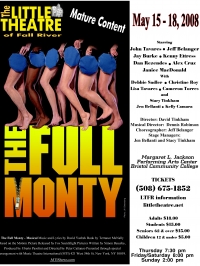
The Full Monty is a musical with a book by Terrence McNally and score by David Yazbek.
In this Americanized version adapted from the 1997 British film of the same name, six unemployed Buffalo steelworkers, low on both cash and prospects, decide to present a strip act at a local club after seeing their wives' enthusiasm for a touring company of professionals. As they prepare for the show, working through their fears, self-consciousness, and anxieties, they overcome their inner demons and find strength in their camaraderie.
The musical had its world premiere at the Old Globe Theatre in San Diego. After 35 previews, the Broadway production, directed by Jack O'Brien and choreographed by Jerry Mitchell, opened on October 26, 2000 at the Eugene O'Neill Theatre, where it ran for 770 performances. The opening night cast included Patrick Wilson, André DeShields, John Ellison Conlee, Marcus Neville, Kathleen Freeman, Denis Jones, Emily Skinner, and Annie Golden. Jane Connell replaced Freeman when she died during the run.
In this Americanized version adapted from the 1997 British film of the same name, six unemployed Buffalo steelworkers, low on both cash and prospects, decide to present a strip act at a local club after seeing their wives' enthusiasm for a touring company of professionals. As they prepare for the show, working through their fears, self-consciousness, and anxieties, they overcome their inner demons and find strength in their camaraderie.
The musical had its world premiere at the Old Globe Theatre in San Diego. After 35 previews, the Broadway production, directed by Jack O'Brien and choreographed by Jerry Mitchell, opened on October 26, 2000 at the Eugene O'Neill Theatre, where it ran for 770 performances. The opening night cast included Patrick Wilson, André DeShields, John Ellison Conlee, Marcus Neville, Kathleen Freeman, Denis Jones, Emily Skinner, and Annie Golden. Jane Connell replaced Freeman when she died during the run.
Sunday in the Park with George

Sunday in the Park with George is a musical with music and lyrics by Stephen Sondheim and book by James Lapine. The musical was inspired by the painting "A Sunday Afternoon on the Island of La Grande Jatte" by Georges Seurat. A complex work revolving around a fictionalized Seurat immersed in single-minded concentration while painting the masterpiece, its Broadway production was greeted with mixed praise by the critics.
Nominated for ten Tony Awards, the musical won only two design awards but won the 1985 Pulitzer Prize for Drama, numerous Drama Desk Awards, and the 2007 Olivier Award for Outstanding Musical Production. It has enjoyed several major revivals, including the 2005-06 UK production first presented at the Menier Chocolate Factory and its subsequent 2008 Broadway transfer.
Nominated for ten Tony Awards, the musical won only two design awards but won the 1985 Pulitzer Prize for Drama, numerous Drama Desk Awards, and the 2007 Olivier Award for Outstanding Musical Production. It has enjoyed several major revivals, including the 2005-06 UK production first presented at the Menier Chocolate Factory and its subsequent 2008 Broadway transfer.
Chess

Chess is a musical with lyrics by Tim Rice and music by Björn Ulvaeus and Benny Andersson, formerly of ABBA. The story involves a romantic triangle between two players in a world chess championship, and a woman who manages one and falls in love with the other. Although the protagonists were not intended to represent any specific individuals, the characters’ personalities are loosely based on those of Victor Korchnoi and Bobby Fischer.
Following the pattern of Jesus Christ Superstar and Evita, a concept album of Chess was recorded in 1984, and generated a number of hit singles. The first theatrical version of Chess opened in London's West End in 1986 and played for three years. A much-altered production premiered on Broadway in 1988, but most critics gave it a poor reception, and it failed to attract large audiences. In spite of this failure in the United States, Chess, like Candide and other "cult" musicals, is frequently revised for new productions, many of which try to merge elements from both the London and Broadway versions.
Chess came seventh in a BBC Radio 2 listener poll of the United Kingdom's "Number One Essential Musicals."
Following the pattern of Jesus Christ Superstar and Evita, a concept album of Chess was recorded in 1984, and generated a number of hit singles. The first theatrical version of Chess opened in London's West End in 1986 and played for three years. A much-altered production premiered on Broadway in 1988, but most critics gave it a poor reception, and it failed to attract large audiences. In spite of this failure in the United States, Chess, like Candide and other "cult" musicals, is frequently revised for new productions, many of which try to merge elements from both the London and Broadway versions.
Chess came seventh in a BBC Radio 2 listener poll of the United Kingdom's "Number One Essential Musicals."
The Last Five Years

The Last Five Years is a one act musical written by Jason Robert Brown. It premiered in Chicago in 2001 and was then produced off-Broadway in March 2002. Since then it has had numerous productions both in the United States and internationally.
The story explores a five-year relationship between Jamie Wellerstein, a rising novelist, and Cathy Hiatt, a struggling actress. The show uses a form of storytelling in which Cathy travels backwards in time (beginning the show at the end of the marriage), and Jamie travels forwards (starting just after the couple have first met). The characters do not directly interact except for a wedding song in the middle.
The story explores a five-year relationship between Jamie Wellerstein, a rising novelist, and Cathy Hiatt, a struggling actress. The show uses a form of storytelling in which Cathy travels backwards in time (beginning the show at the end of the marriage), and Jamie travels forwards (starting just after the couple have first met). The characters do not directly interact except for a wedding song in the middle.
Reefer Madness
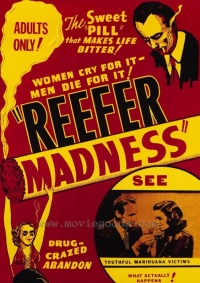
Reefer Madness is a musical satire of the 1936 cult classic Reefer Madness that opened in Los Angeles in 1998. The book and lyrics were written by Kevin Murphy and the music by Dan Studney. Directed by Andy Fickman, it was initially shown in a theatre in Los Angeles and then moved to the New York "Off-Broadway" scene. The show opened Off Broadway on September 15, 2001, and closed shortly thereafter. A film version was made for TV in 2005. Rodgers and Hammerstein Theatricals now administers the stock/amateur rights, and the show has been produced by local theatre groups in several cities, including Toronto, Seattle, Philadelphia and London. The 2008 production at Washington DC's Studio Theatre won 2 Helen Hayes Awards (directing and outstanding Resident Production). The show made its Australasian debut in Sydney on July 24 2008 and will have a production in London in 2009.
Parade
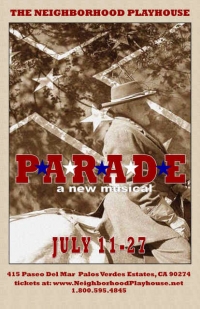
Parade is a musical with a book by Alfred Uhry and music and lyrics by Jason Robert Brown. The musical was first produced on Broadway at the Vivian Beaumont Theater on December 17, 1998. The production was directed by Harold Prince and closed 28 February 1999 after only 39 previews and 84 regular performances. It starred Brent Carver as Leo Frank, Carolee Carmello as Lucille Frank, and Christy Carlson Romano as Mary Phagan.
The musical won Tony Awards for best book and best score (out of nine nominations) and six Drama Desk Awards. The show has enjoyed a U.S. national tour and numerous professional and amateur productions both in the U.S. and abroad.
The musical won Tony Awards for best book and best score (out of nine nominations) and six Drama Desk Awards. The show has enjoyed a U.S. national tour and numerous professional and amateur productions both in the U.S. and abroad.
All Shook Up
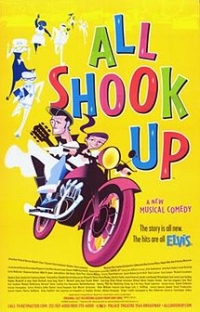
All Shook Up is a jukebox musical featuring the music of the classic rock star Elvis Presley, with a book by Joe DiPietro. The story is based on the plot of William Shakespeare's Twelfth Night.
The musical had a developmental staging at the Goodspeed Musicals May 13-June 6, 2004, with most of the Broadway cast, except for Manley Pope in the lead role of Chad. Christopher Ashley directed, with choreography by Jody Moccia. The musical then had a tryout in Chicago from December 19, 2004, through January 23, 2005. After the tryout, changes were made to the finale and to add "a more specific instrumental and vocal voice" for Chad. The musical opened on Broadway at the Palace Theatre on March 24, 2005 and closed on September 25, 2005 after 213 performances and 33 previews. Directed by Christopher Ashley, with choreography by Ken Roberson, the original Broadway cast included Cheyenne Jackson (Chad), Jenn Gambatese (Natalie Haller/"Ed"), and Jonathan Hadary (Jim Haller).
The musical had a developmental staging at the Goodspeed Musicals May 13-June 6, 2004, with most of the Broadway cast, except for Manley Pope in the lead role of Chad. Christopher Ashley directed, with choreography by Jody Moccia. The musical then had a tryout in Chicago from December 19, 2004, through January 23, 2005. After the tryout, changes were made to the finale and to add "a more specific instrumental and vocal voice" for Chad. The musical opened on Broadway at the Palace Theatre on March 24, 2005 and closed on September 25, 2005 after 213 performances and 33 previews. Directed by Christopher Ashley, with choreography by Ken Roberson, the original Broadway cast included Cheyenne Jackson (Chad), Jenn Gambatese (Natalie Haller/"Ed"), and Jonathan Hadary (Jim Haller).
Anything Goes
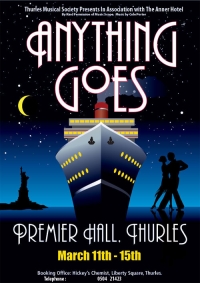
Anything Goes is a musical with music and lyrics by Cole Porter. The book was a collaborative effort by Guy Bolton and P.G. Wodehouse, revised by Howard Lindsay and Russel Crouse. The story concerns madcap antics aboard an ocean liner bound from New York to London. Billy Crocker is a stowaway in love with heiress Hope Harcourt, who is engaged to Lord Evelyn Oakleigh. Nightclub singer Reno Sweeney and Public Enemy #13 Moonface Martin aid Billy in his quest to win Hope. The musical introduced such songs as "Anything Goes", "You're the Top", and "I Get a Kick Out of You".
Since its 1934 debut on Broadway, the musical has been revived several times in the United States and Britain and has been filmed twice. Anything Goes and Porgy and Bess are the only 1930s musicals that are still regularly revived.
Since its 1934 debut on Broadway, the musical has been revived several times in the United States and Britain and has been filmed twice. Anything Goes and Porgy and Bess are the only 1930s musicals that are still regularly revived.
Chitty Chitty Bang Bang

Chitty Chitty Bang Bang, also known as Chitty the Musical, is a stage musical based on the 1968 film produced by Cubby Broccoli. The music and lyrics were wriiten by Richard and Robert Sherman with book by Jeremy Sams. It opened in the West End at the London Palladium theatre on April 16, 2002 with six new songs by the Sherman Brothers who wrote the original academy award nominated title and song score as well. The London production, directed by Adrian Noble with musical staging and choreography by Gillian Lynne, closed in September 2005.
Funny Girl

Funny Girl is a musical with a book by Isobel Lennart, music by Jule Styne, and lyrics by Bob Merrill.
The semi-biographical plot is based on the life and career of Broadway and film star and comedienne Fanny Brice and her stormy relationship with entrepreneur and gambler Nicky Arnstein. Its original title was My Man.
After seventeen previews, the Broadway production, directed by Garson Kanin and choreographed by Carol Haney under the supervision of Jerome Robbins, opened on March 26, 1964 at the Winter Garden Theatre, subsequently transferring to the Majestic Theatre and the Broadway Theatre to complete its total run of 1348 performances. The original cast included Barbra Streisand, Sydney Chaplin, Kay Medford, Danny Meehan, Jean Stapleton, and Lainie Kazan, who also served as Streisand's understudy. Later in the run, Streisand and Chaplin were replaced by Mimi Hines and Johnny Desmond, and Hines' husband and comedy partner Phil Ford also joined the cast.
The musical was produced by Ray Stark, who was Brice's son-in-law via his marriage to her daughter Frances. The production was nominated for eight Tony Awards, but facing tough competition from Hello, Dolly!, it failed to win in any categories.
The 1966 West End production at the Prince of Wales Theatre, starring Streisand, was directed by Lawrence Kasha.
The semi-biographical plot is based on the life and career of Broadway and film star and comedienne Fanny Brice and her stormy relationship with entrepreneur and gambler Nicky Arnstein. Its original title was My Man.
After seventeen previews, the Broadway production, directed by Garson Kanin and choreographed by Carol Haney under the supervision of Jerome Robbins, opened on March 26, 1964 at the Winter Garden Theatre, subsequently transferring to the Majestic Theatre and the Broadway Theatre to complete its total run of 1348 performances. The original cast included Barbra Streisand, Sydney Chaplin, Kay Medford, Danny Meehan, Jean Stapleton, and Lainie Kazan, who also served as Streisand's understudy. Later in the run, Streisand and Chaplin were replaced by Mimi Hines and Johnny Desmond, and Hines' husband and comedy partner Phil Ford also joined the cast.
The musical was produced by Ray Stark, who was Brice's son-in-law via his marriage to her daughter Frances. The production was nominated for eight Tony Awards, but facing tough competition from Hello, Dolly!, it failed to win in any categories.
The 1966 West End production at the Prince of Wales Theatre, starring Streisand, was directed by Lawrence Kasha.
Marry Me A Little
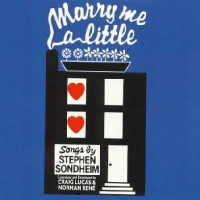
Marry Me A Little is a musical with lyrics and music by Stephen Sondheim. Conceived by Craig Lucas and Norman René, it set songs cut from Sondheim's better-known musicals to a simple dialogue-free plot about the relationship between two people who are in an emotional conflict during an evening in their one-room apartment.
The musical originally was staged by the off-off-Broadway Production Company. It opened on October 29, 1980 and closed December 28, 1980. It re-opened March 12, 1981 at the off-Broadway Actor's Playhouse, where it ran for 96 performances. Directed by Rene and choreographed by Don Johanson, it starred Craig Lucas and Suzanne Henry.
The musical originally was staged by the off-off-Broadway Production Company. It opened on October 29, 1980 and closed December 28, 1980. It re-opened March 12, 1981 at the off-Broadway Actor's Playhouse, where it ran for 96 performances. Directed by Rene and choreographed by Don Johanson, it starred Craig Lucas and Suzanne Henry.
Sister Act

Sister Act is a 1992 American comedy film released by Touchstone Pictures. Directed by Emile Ardolino, it features musical arrangements by Marc Shaiman and stars Whoopi Goldberg as a Reno lounge singer who has been put under protective custody in a San Francisco convent and has to pretend to be a nun when a mob boss puts her on his hit list. Also in the cast are Maggie Smith, Kathy Najimy, Wendy Makkena, Mary Wickes, and Harvey Keitel. The film is #83 on Bravo's The 100 Funniest Movies list.
The film was followed by a 1993 sequel, Sister Act 2: Back in the Habit. It also inspired a musical stage version that premiered at the Pasadena Playhouse in Pasadena, California in 2006.
The film was followed by a 1993 sequel, Sister Act 2: Back in the Habit. It also inspired a musical stage version that premiered at the Pasadena Playhouse in Pasadena, California in 2006.
Jane Eyre

Jane Eyre is a musical drama with music by composer-lyricist Paul Gordon and a book by John Caird, based on the novel by Charlotte Brontë.
The premiere of the musical took place in Wichita, Kansas in the autumn of 1995. Minor roles and the large ensemble of schoolgirls for the scenes at Brocklehurst's school were cast locally, while the directors brought several members of the principal cast from New York. The musical was well received, and a recording of this rendition allowed the creative team and their backers to slowly move the project towards an opening on Broadway.
The musical debuted at the Brooks Atkinson Theatre on November 9, 2000, with an official opening on December 10, 2000. It enjoyed 36 previews and 209 regular performances before closing on June 10, 2001. Marla Schaffel, who played the title character, won a Drama Desk Award for her performance. The production was directed by John Caird and Scott Schwartz, with choreography by Jayne Paterson.
A revised version is currently in the works, with an expected regional debut in the 2008 or 2009 season.
The premiere of the musical took place in Wichita, Kansas in the autumn of 1995. Minor roles and the large ensemble of schoolgirls for the scenes at Brocklehurst's school were cast locally, while the directors brought several members of the principal cast from New York. The musical was well received, and a recording of this rendition allowed the creative team and their backers to slowly move the project towards an opening on Broadway.
The musical debuted at the Brooks Atkinson Theatre on November 9, 2000, with an official opening on December 10, 2000. It enjoyed 36 previews and 209 regular performances before closing on June 10, 2001. Marla Schaffel, who played the title character, won a Drama Desk Award for her performance. The production was directed by John Caird and Scott Schwartz, with choreography by Jayne Paterson.
A revised version is currently in the works, with an expected regional debut in the 2008 or 2009 season.
The Da Vinci Code
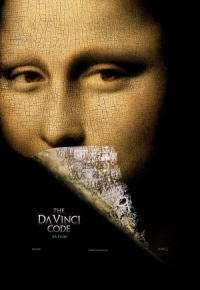
The Da Vinci Code is a 2006 feature film, which is based on the bestselling 2003 novel The Da Vinci Code by Dan Brown. The film was starring Tom Hanks, Audrey Tautou, Ian McKellen. It was one of the most anticipated films of 2006, and was previewed at the opening night of the Cannes Film Festival on May 17, 2006. The Da Vinci Code then entered major release in many other countries on May 18, 2006 and was released in the United States by Columbia Pictures on May 19, 2006.
Because of some controversial interpretations of Christian history in both the book and movie, they were criticized by the Roman Catholic Church. Some bishops urged members to boycott the film. Many of the early showings were accompanied by protesters outside the movie theaters, and early critical reviews were decidedly mixed. However, in its opening weekend, the film earned over US$224 million worldwide, second only to the opening of 2005's Star Wars Episode III: Revenge of the Sith. It is the second highest grossing movie of 2006 worldwide — having reached US$758,239,851 as of November 2, 2006. The film's soundtrack, composed by Hans Zimmer, was nominated for the 2007 Golden Globe Award for Best Original Score.
Because of some controversial interpretations of Christian history in both the book and movie, they were criticized by the Roman Catholic Church. Some bishops urged members to boycott the film. Many of the early showings were accompanied by protesters outside the movie theaters, and early critical reviews were decidedly mixed. However, in its opening weekend, the film earned over US$224 million worldwide, second only to the opening of 2005's Star Wars Episode III: Revenge of the Sith. It is the second highest grossing movie of 2006 worldwide — having reached US$758,239,851 as of November 2, 2006. The film's soundtrack, composed by Hans Zimmer, was nominated for the 2007 Golden Globe Award for Best Original Score.
Charlie Brown

Charles "Charlie" Brown is the main character in the comic strip Peanuts by Charles M. Schulz.
Moulin Rouge!

Moulin Rouge! is a 2001 musical film directed by Baz Luhrmann, based largely on the Giuseppe Verdi opera La Traviata. It tells the story of a young British poet/writer, Christian, who falls in love with the star of the Moulin Rouge, cabaret actress and courtesan Satine, played by Ewan McGregor and Nicole Kidman, respectively. It uses the musical setting of the Montmartre Quarter of Paris, France. The film was nominated for eight Oscars, including Best Picture, and won two: for art direction and costume design. It was shot at Fox Studios in Sydney, Australia.
In 2006, Moulin Rouge! ranked twenty-fifth on the American Film Institute's list of best musicals.
In 2006, Moulin Rouge! ranked twenty-fifth on the American Film Institute's list of best musicals.
Saturday Night Fever

Saturday Night Fever is a 1977 film starring John Travolta as Tony Manero, a troubled Brooklyn youth whose weekend activities are dominated by visits to a local discothèque. While in the disco, Tony is the king, and the visits help him to temporarily forget the reality of his life: a dead-end job, clashes with his unsupportive and squabbling parents, tensions in the local community, and his associations with a gang of dead-beat friends.
A huge commercial success, the movie significantly helped to popularize disco music around the world and made Travolta a household name. The Saturday Night Fever soundtrack, featuring disco songs by the Bee Gees, became the best selling soundtrack at that time and held the record until 1999 when soundtrack to The Bodyguard overtook it. The film is also notable for being one of the first instances of cross-media marketing, with the tie-in soundtrack's single being used to help promote the film before its release and the film popularizing the entire soundtrack after its release.
The story is based upon a 1976 New York magazine article by British writer Nik Cohn, "Tribal Rites of the New Saturday Night." In the late-1990s, Cohn acknowledged that the article had been fabricated. A newcomer to the United States and a stranger to the disco lifestyle, Cohn was unable to make any sense of the subculture he had been assigned to write about. The characters who were to become Tony Manero and his friends sprang almost completely from his imagination. The film also showcased aspects of the music, the dancing, and the subculture surrounding the disco era: symphony-orchestrated melodies, haute-couture styles of clothing, sexual promiscuity, and graceful choreography.
A huge commercial success, the movie significantly helped to popularize disco music around the world and made Travolta a household name. The Saturday Night Fever soundtrack, featuring disco songs by the Bee Gees, became the best selling soundtrack at that time and held the record until 1999 when soundtrack to The Bodyguard overtook it. The film is also notable for being one of the first instances of cross-media marketing, with the tie-in soundtrack's single being used to help promote the film before its release and the film popularizing the entire soundtrack after its release.
The story is based upon a 1976 New York magazine article by British writer Nik Cohn, "Tribal Rites of the New Saturday Night." In the late-1990s, Cohn acknowledged that the article had been fabricated. A newcomer to the United States and a stranger to the disco lifestyle, Cohn was unable to make any sense of the subculture he had been assigned to write about. The characters who were to become Tony Manero and his friends sprang almost completely from his imagination. The film also showcased aspects of the music, the dancing, and the subculture surrounding the disco era: symphony-orchestrated melodies, haute-couture styles of clothing, sexual promiscuity, and graceful choreography.
The Simpsons

The Simpsons is an American animated sitcom which was created by Matt Groening for the Fox Broadcasting Company. It is a satirical parody of the middle class American lifestyle epitomized by its titular family, which consists of Homer, Marge, Bart, Lisa, and Maggie. The show is set in the fictional town of Springfield, and it lampoons many aspects of the human condition, as well as American culture, society as a whole, and television itself.
The family was conceived by Groening shortly before a pitch for a series of animated shorts with the producer James L. Brooks. Groening created a dysfunctional family and named the characters after members of his own family, substituting Bart for his own name. The shorts became a part of The Tracey Ullman Show on April 19, 1987. After a three-season run, the sketch was developed into a half-hour prime time show and was an early hit for Fox, becoming the first Fox series to land in the Top 30 ratings in a season (1992-1993).
Since its debut on December 17, 1989, the show has broadcast 420 episodes and the twentieth season will commence airing in on September 28, 2008. The Simpsons Movie, a feature-length film, was released in theaters worldwide on July 26 and July 27, 2007, and has grossed approximately US$526.2 million worldwide to date.
The Simpsons has won dozens of awards since it debuted as a series, including 24 Emmy Awards, 26 Annie Awards and a Peabody Award. Time magazine's December 31, 1999 issue named it the 20th century's best television series, and on January 14, 2000 it was awarded a star on the Hollywood Walk of Fame. The Simpsons is the longest-running American sitcom and the longest-running American animated program. Homer's annoyed grunt "D'oh!" has been adopted into the English lexicon, while The Simpsons has influenced many adult-oriented animated sitcoms.
The series' distinctive theme song was composed by musician Danny Elfman in 1989, after Groening approached him requesting a retro style piece. This piece, which took two days to create, has been noted by Elfman as the most popular of his career.
The family was conceived by Groening shortly before a pitch for a series of animated shorts with the producer James L. Brooks. Groening created a dysfunctional family and named the characters after members of his own family, substituting Bart for his own name. The shorts became a part of The Tracey Ullman Show on April 19, 1987. After a three-season run, the sketch was developed into a half-hour prime time show and was an early hit for Fox, becoming the first Fox series to land in the Top 30 ratings in a season (1992-1993).
Since its debut on December 17, 1989, the show has broadcast 420 episodes and the twentieth season will commence airing in on September 28, 2008. The Simpsons Movie, a feature-length film, was released in theaters worldwide on July 26 and July 27, 2007, and has grossed approximately US$526.2 million worldwide to date.
The Simpsons has won dozens of awards since it debuted as a series, including 24 Emmy Awards, 26 Annie Awards and a Peabody Award. Time magazine's December 31, 1999 issue named it the 20th century's best television series, and on January 14, 2000 it was awarded a star on the Hollywood Walk of Fame. The Simpsons is the longest-running American sitcom and the longest-running American animated program. Homer's annoyed grunt "D'oh!" has been adopted into the English lexicon, while The Simpsons has influenced many adult-oriented animated sitcoms.
The series' distinctive theme song was composed by musician Danny Elfman in 1989, after Groening approached him requesting a retro style piece. This piece, which took two days to create, has been noted by Elfman as the most popular of his career.
Amelie Poulain

Amélie is a 2001 French film directed by Jean-Pierre Jeunet and starring Audrey Tautou. Its original French title is Le Fabuleux Destin d'Amélie Poulain ("The Fabulous Destiny of Amélie Poulain"; poulain is French for foal). Written by Jeunet with Guillaume Laurant, the film is a whimsical and somewhat idealised depiction of contemporary Parisian life, set in Montmartre. It tells the story of a shy waitress who decides to change the lives of those around her for the better, while struggling with her own isolation.
Amélie won best film at the European Film Awards; it won four César Awards (including Best Film and Best Director), two BAFTA Awards (including Best Original Screenplay), and was nominated for five Academy Awards.
Amélie won best film at the European Film Awards; it won four César Awards (including Best Film and Best Director), two BAFTA Awards (including Best Original Screenplay), and was nominated for five Academy Awards.
 Sheet Music Drive is a web site for those who wants to access popular sheet music easily,
letting them download the sheet music for free for trial purposes.
It's completely free to download and try the listed sheet music, but you have to delete the files after 24 hours of trial period.
Don't forget, if you like the piece of music you have just learned playing,
treat the artist with respect, and go buy the original sheet music.
Sheet Music Drive is a web site for those who wants to access popular sheet music easily,
letting them download the sheet music for free for trial purposes.
It's completely free to download and try the listed sheet music, but you have to delete the files after 24 hours of trial period.
Don't forget, if you like the piece of music you have just learned playing,
treat the artist with respect, and go buy the original sheet music.